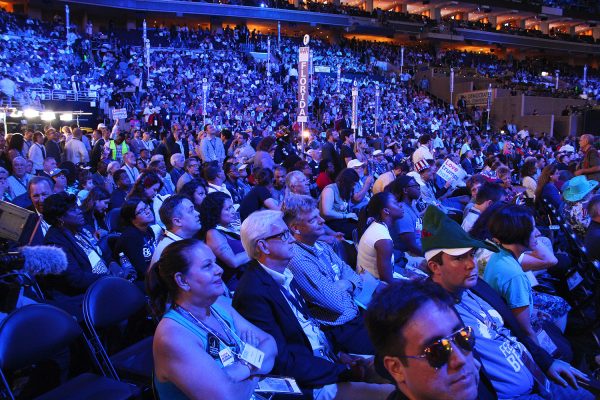
The New York Times asked 93 of the 771 Democratic Party officials who will be automatically seated at the convention in July — the so-called “superdelegates” — if they would vote for Bernie Sanders if the socialist emerged with a plurality, but not a majority, of the pledged delegates.
Only nine said they would.
Sanders’ supporters are predictably up in arms, arguing the party “establishment” is conspiring to overturn “the will of the people”.
Some are threatening to sit out the election in November if their man doesn’t prevail.
Imagine being so safe and comfortable that you could stomach another four years of children being separated from their parents at the border and killed in detention, American citizens of color being harassed by immigration authorities, institutions being demolished, the rule of law turned into a dead letter and the liberal world order torn to shreds in the service of Vladimir Putin if the only alternative is voting for your second-best candidate. I’m not terribly well-versed in the rhetoric of the social-justice left, but I believe this is what they call “privilege”?
Presumptuous
It is anyway presumptuous. Superdelegates aren’t fat cats who lounge on the sidelines of the convention in smoke-filled rooms. They are Democratic governors, members of Congress, former presidents and vice presidents, and 438 members of the Democratic National Committee, who in many cases have devoted their entire careers to the Democratic Party.
The notion that not they, but left-wing opinion writers and activists, who have so little affinity for the party that they would turn their backs on it if it nominated anyone but Sanders, should decide the presidential nomination is so ludicrous no Democrat should take it seriously.
Yet they do. In response to complaints from Sanders and his supporters that superdelegates swayed the 2016 primaries in favor of Hillary Clinton, the party has changed its rules. This year, what are now called automatic delegates will only be allowed to vote if the convention either deadlocks on the first ballot or if a candidate is already assured of victory.
If a candidate wins a majority of the 3,979 pledged delegates in the state-by-state contests, the automatic delegates will have no role.
Candidates can no longer add superdelegates’ endorsements to their delegate total, nor will superdelegates be able to tip a close contest in favor of one candidate or another — which is what they were for.
Only if no candidate has a majority on the first ballot will superdelegates be allowed to vote freely. But that also applies to the pledged delegates: many of them become “unbound” after an unsuccessful first ballot.
More power
Rather than strip party officials of their power, Democrats should give them more.
One of America’s two political parties has already been taken over by an outsider. The result has been abysmal — for the country, and the party. Republicans have lost nearly every election since Donald Trump became president.
Republican officials could have stopped Trump, either by instructing his 2016 rivals to unite or by denying him the nomination at the convention. Some delegates tried, but they were overruled by national party leaders.
They gave way to “the will of the people”, which in the Republican contest that year meant fourteen out of 31 million primary voters who backed Trump — out of 230 million eligible voters nationwide.
Primary voters don’t represent “the people”. Only the most committed voters participate in them. Unless party officials, who typically had to win over non-party loyalists to get elected themselves, are willing to exert their influence, they could end up with a candidate who appeals to one faction but not the whole party, let alone swing voters.
Cautionary tale
America is not unique in this.
In France, the two major parties adopted the American primary model in the last election. Whereas in the past, politicians and party officials would nominate such level-headed presidential candidates as François Mitterrand, Jacques Chirac and Lionel Jospin, in 2017 the Socialists picked the little-known but woke Benoît Hamon over their center-left prime minister, Manuel Valls. Instead of Alain Juppé, another former prime minister with centrist appeal, the Republicans nominated the socially conservative François Fillon, who was unappealing to most French voters even before it emerged he had given his wife, Penelope, a fake job that was paid for by the party. Emmanuel Macron defeated the two handedly — and blew up the old parties in the process.
French politics is now a contest between the liberal-technocratic center and the nationalist right. The left has no power. Center-right voters must decide whether Macron or Marine Le Pen, the far-right leader, is the lesser of two evils.
Democrats and Republicans may think their parties are more entrenched, and arguably they are. But the Socialists and Republicans (under various names) dominated French politics for half a century before they suddenly collapsed. American party leaders may want to take note.
